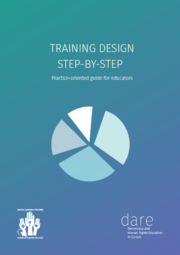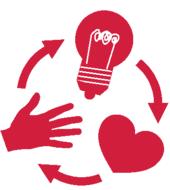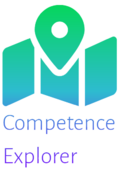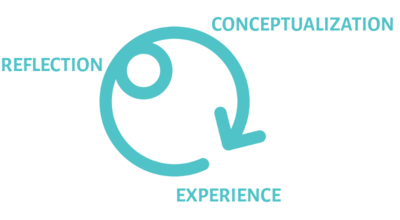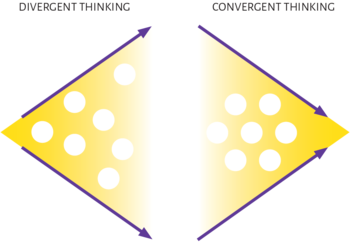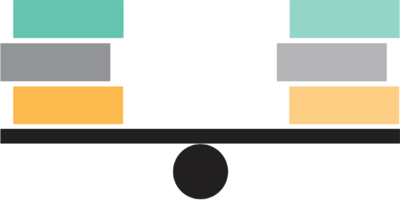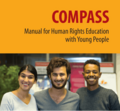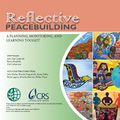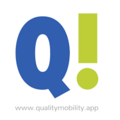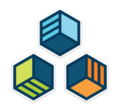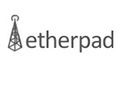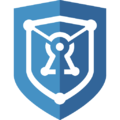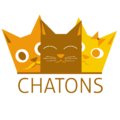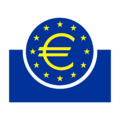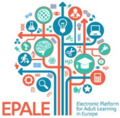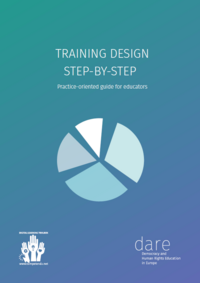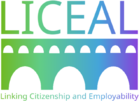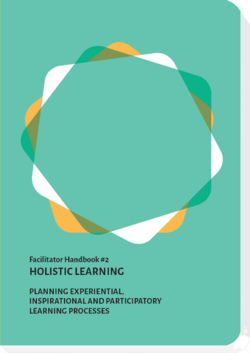Training Design Step-by-Step
Download the content of this page and additional checklists as a brochure:
Brochure:
Training Design Step-by-Step
Checklists:
1 Define goals & competences
2 Planning matrix
3 My competences
Elements of a Learning Process
A learning process consists on the one hand of standard elements. No matter if it lasts several days, several hours, or only one hour,
1) the working conditions need to be clarified and created, or
2) learners need to be enabled to involve their qualities, curiosity and expertise. At several stages of a longer process they also need systematically planned opportunities to
3) reflection on their needs, questions and experiences, and also to assess their learning during the process (formative evaluation). A final evaluation focuses on the learning outcome, its relevance for their future and on the evaluation of the learning process they were involved in.
4) Work on topics also flows into the design of an agenda in the form of blocks.
5) Finally, learners and educators need to describe learning outcome or competence development.
While these standard elements offer orientation for the design of trainings or workshops, they are always filled differently. If one goal is to align the educational process with the needs and abilities of the learners, then it is also necessary to leave room for adaptation of the planning in the process, including with the learners.
Because the success of competence-centred education depends not on certificates or grades but what learners are able to demonstrate, to what they are enabled to do, also planning needs to apply: transparency – name and specify goals and methods. Furthermore, these need to be in a logical relation. Learner in the centre: needs of learners influence the program design in a significant way. An explicit competence description helps to achieve this.
This page aims to support educators during planning step-by-step.
1. Define the General Purpose of the Activity
Before going deeper into planning, the definition of the goals has priority. They help educators and their organisations to prioritize and sort what they really want to achieve (and to assess what extent they achieved them so far). In contrast, of thinking in methods first, is that educators would not necessarily be able to describe the deeper meaning behind an unit or method.
- Goals create transparency about what should be achieved and what is going happen. They set also criteria for assessment/evaluation.
- Clear goals make educators more flexible and free to negotiate with participants and to adapt plans when they are confident that the overall process is moving in the right direction or should change.
- Following a structured design helps to later, during the workshop, to establish a healthy balance between a goal-oriented implementation according to a plan and a process-oriented approach embracing participation and suggestions by the learners.
- This implies that the agenda and methodology need to be presented, discussed, co-decided, and leave space for alternative suggestions
Education addressing transversal competences has always a universal dimension. In example, addressing “critical thinking” helps learners in many different social situations and activities. In conclusion addressing transversal competences is generally an aim of competence-centered learning. In consequence, activities need to provide space for these kind of learnings.
Second, if competence-cenetered learning should help people to apply their abilities in their lifes, the socio-economic-cultural contexts become important. Competence-centered learning has a meta-dimension, instigating understanding of and reasoning about these different roles and contexts: VET-related learning can link with experience of learners outside the job. Civic learning could relate to the job contexts of learners.
In particular, Education for Democratic Citizenship and Human Rights Education bring a transversal domain into learning which is relevant for all. Consequently, democracy and rights should be understood as a goal dimension of transversal learning in democracies.
These things in advance suggest that before thinking about very concrete goals of a training, we should think about the social and political level – about its overall social purpose.
Goals and Sub-goals
From the general to the concrete. One or a few overall objectives are derived from the social objective level and the specific issue to be addressed. In order to gain clarity, it could be useful to self-limit oneself to one general goal for the meeting with a maximum of 5 subgoals
Different levels will certainly become mixed up in collective thinking, and it will not be easy to decide between the overall objective and subordinate goals. In addition, you ultimately have to decide at which level your own training should start, what should be in the foreground. These or similar methods could help to identify the goals from a diversity of different cards or keywords:
2. Towards Competences
Check also the competences you aim to adress by your training or workshop. Different competence frameworks could serve as a source of inspiration here. A first step to come to competence-centered plans ist to rephrase each of the goals from a perspective of learners and their ability after the training: “After my workshop, participants should be able to (do, act, use, think differently, …)….”
- Traditional description: We worked on the topic “critical thinking” and subtopic XYZ.
- Competence-centered: Participants understood the concept of critical thinking, they practiced the approach, and demonstrated their ability to apply it on complex topics.
Knowledge, Skills and Attitudes
- Knowledge is composed of the facts and figures, concepts, ideas and theories which are already established and support the understanding of a certain area or subject;
- Skills are defined as the ability and capacity to carry out processes and use the existing knowledge to achieve results;
- Attitudes Disposition and mind-sets to act or react to ideas, persons or situations.
Use Active Words
Lazy words: getting familiar, perceive, getting to know (Vrabl 2016)[1]. The following table of active words might replace some common lazy words.
Active words: act, apply, analyse, argue for, assess, assume, categorize, check, choose, collaborate, collect, combine, compare, conceptualize, construct, connect, conclude, criticize, dare, discover, discuss, distinct, decide, design, develop, diagnose, estimate, evaluate, explain, express, experiment, find out, formulate, illustrate, improve, include, interact, implement, judge, label, list, localize, observe, organize, outline, plan, present, prove, reflect, repeat, reproduce, remember, reinforce, shape, state, sketch, solve, support, test, transfer, transform, understand, use, validate, verify…
3. Explore Competence Frameworks
Which areas of expertise and which competence frameworks are worth to explore? Consult some competence frameworks.
Competence Frameworks as a Source of Inspiration
- A tool for an overview of different competence frameworks: Competence Explorer
- Scaffold Card Game by European Training Foundation
- Card Game: Competences for a Democratic Culture
The overview over different competence frameworks helps also to understand better, how different concepts perceive and define a relevant competence. In example, for “critical thinking” exist descriptions with different and similar elements. Which ones would educators in their workshop follow?
Example: Critical Thinking
- Can identify any discrepancies or inconsistencies or divergences in materials being analysed. Can use explicit and specifiable criteria, principles or values to make judgments (RFCDC).
- Critically assess the credibility and reliability of sources of data, information and digital content. Critically assess data, information and digital content (DigComp).
- Ability to interpret, understand and express creativity through digital media, as critical thinkers… Go beyond simply “being able to” use one or another media, for example, or simply to “be informed” about something. (Digital Citizenship Education).
- To assess information and arguments, identify assumptions, challenge the status quo, and reflect on how personal, social and cultural backgrounds influence thinking and conclusions (GreenComp).
- Awareness of potential biases in the data and one’s personal limitations, while collecting valid and reliable information and ideas from diverse and reputable sources. Comparing, analysing, assessing, and synthesising data, information, ideas, and media messages in order to draw logical conclusions. Developing creative ideas, synthesising and combining concepts and information from different sources in view of solving problems (LifeComp).
- Critical thinking is that mode of thinking — about any subject, content, or problem — in which the thinker improves the quality of his or her thinking by skilfully analysing, assessing, and reconstructing it (The Foundation for Critical Thinking).
4. Create an Overall Timeplan
In case of longer workshops or trainings half days or days with specific goals or focus prestructure the agenda. A detailed planning of the sub elements (“units”) will take place in a next step. When looking at the overall period, it is also important to distribute necessary and recurring elements in the plan. For example, breaks are required or the days start and end with a joint planning and evaluation session. A meeting would often start with sessions to create appropriate working conditions or exploring the needs and expectations. And also at the end of milestones or the whole event transfer and evaluation are crucial.
Recurring Elements
First Steps: Needs exploration | Good working conditions | Name games, getting to know each other | Personalities, beliefs and expertise: more
Guidance through the Process: Daily briefing & concluding sessions | energizers & cool-downs: more
Evaluation & Reflection: Initial assessment | Regular formative assessment and feedback | Final evaluation: more
Transfer & Documentation: From training space into life | Securing the findings: more
Other Method Areas
For the reason of completeness, it should be mentioned that also other areas of methodology are relevant, for which educators must prepare themselves so that they can fall back on them if necessary, such as
- Conflict management
- Diversity
- Communication & language
- Moderation, presentation
- Visual facilitation
- ...
5. Tool: Planning Matrix
From larger parts (in example days to more detailed planning of “units”. Seminar concepts are usually planned unit by unit according to the following aspects and separating them in a table matrix (Heublein & Zimmermann, 2016, p. 38 ff.). Define the time necessary for each unit. Try to be realistic. Include breaks (which should be considered as necessary informal group, reflection or recreation time).
Explanation: Elements of the Matrix
Expand for more information:
Goals
Go into details. Formulate the goals from the perspective of your participants, using the past tense: “The participants have learned/experienced/done”…
Content
Identify the relevant content. Which aspects of the content are important? What knowledge is relevant?
Method
Choose a method: Methods have to correspond to their goals. While picking from among several possibilities for how to teach a topic, the question could guide: Which of the methods is best suited to achieve the goals? How can we achieve the goal and address the topical aspects?
Who?
A larger team can include one educator and a supporting co-facilitator. If running a meeting as a team, it makes sense to agree on an educator responsible for the unit who decides on content and methods and on a co-moderator.
Material and Remarks
Add the necessary material and organizational remarks. What materials, preparation or specific requirements are needed?
Check: Addressed Competences
What (sub)competences – knowledge, skills, attitudes, values – are addressed in here? (For inspiration: Competence Explorer)
Indicators for Applied Competences
What behaviour or demonstrated knowledge indicates the educators that participants applied the respective competences? If there are other indicators as well, add them too.
Unit Planning
Define the time necessary for each unit. Try to be realistic. Include breaks (which should be considered as necessary informal group, reflection or recreation time).
|
|
Example: |
11:00-12:30 |
Lunch break |
14:00-15:15 |
1. Goals“The participants have learned/experienced/done...” |
Sub-unit A (9:00-9:45) P. learned each other's names. P. familiarised with the group personally and in terms of the topic at hand. --- Sub-unit B (9:45-10:30) ... |
|||
2. ContentWhich aspects of the content are important? What knowledge is relevant? |
Sub-unit A (9:00-9:45) Active icebreaking Possible Questions: Names, how much do you know about topic X? Interests... --- Sub-unit B (9:45-10:30) ... |
|||
3. MethodHow will I achieve the goal and address the topical aspects? |
Sub-unit A (9:00-9:45) Shoe Game
Sociometric Line-up
--- Sub-unit B (9:45-10:30) ... |
|||
4. Who?Who plans, moderates or guides participants through the step(s)? |
Sub-unit A (9:00-9:45)
--- Sub-unit B (9:45-10:30) |
|||
5. Material and remarksWhat materials, preparation or specific requirements are needed? |
Sub-unit A (9:00-9:45)
--- Sub-unit B (9:45-10:30) |
|||
6. Check: Addressed CompetencesWhat (sub)competence - knowledge, skills, attitudes, values- is addressed in here? Check: Competence Explorer |
Sub-unit A (9:00-9:45)
--- Sub-unit B (9:45-10:30) |
|||
7. Indicators for Applied Competences |
Sub-unit A (9:00-9:45) P’s talk to each other, ask questions, start a natural conversation. They interact and show interest in each other during the sociometric line-up. --- Sub-unit B (9:45-10:30) |
6. Process Dynamics that Influence the Learning Experience
Various aspects influence learning processes and must therefore be taken into account during planning. These complement each other in places, but sometimes they also contradict each other. The learning as an activity is curricular, the group dynamics is evolving during the process. A topical concept is promoting a logical structure. Creative thinking requires methodological alternation. A way must be found to integrate these logics appropriately:
#1 Nonlinear and curricular Nature of Learning
#2 Divergence and Convergence
Learning oscillates between two opposite ways of thinking. Divergent thinking opens the mind to different impulses – rather open-ended and explorative. Convergent thinking is narrowing our thinking. It's logical and directed toward a conclusion or result. Their interplay characterizes the whole process and also explains the dynamics in smaller units on a micro-level.
#3 Content Order
#4 Group Dynamics
Fourth, the group dynamics need to be taken into consideration. In particular, when a group is starting together, the phases of group development claim their space from group formation to storming, then norming toward finding into a performing mode (Tuckman, 1965). Consider the idea of cooperative Learning, team building measures at the beginning and recognize, that probably higher group performance will be possible during the later steps of a process.
#5 Competence development
Competence-oriented learning processes address equally the three dimensions cognition, emotion and practice (or head, heart and hand). At the end the workshop, lecture or longer educational programme should support the participants' acquisition of competences.
Check: Do the planned elements address the most relevant specific (sub) competences in a balanced way – knowledge, attitudes, values, skills? Are there enough opportunities for self-development, participation and co-creation (active learning)?
7. Choosing and Adjusting Methods
A competent choice of methods and approaches means to identify and adjust those methods and competences that serve the learning process best during planning and also during implementation.
In particular, the relationship between objectives and method is crucial. The choice of method must be justifiable in terms of educational objectives. Furthermore, the personal competence of educators, their familiarity with certain approaches and methods has an influence on the choice. Obviously this aspect of planning and implementing goes beyond the scope of this material and requires deeper learning and experience of educators. Finally, however, we would like to give the educators some criteria for conscious selection.
General Criteria
Prohibition of overwhelming (the opinion and attitude of the facilitator should not be imposed on the participants, they should have the freedom to form their own judgement, which is respected by all. This includes voluntariness – no one should be forced to experience a method, selection of methods respects the needs and limitations of participants. And transparency – in order to help learners to make a judgement on this (and also to be able to reflect on the learning process later (i. e. why a method was chosen, regards the goal and style).
Controversy requirement – differences of opinion and controversial positions should be reflected in the learning process and used constructively. Learner-centred and action-oriented – the needs, motivations and basic principles of the learners and their participation in the learning process are the starting point for the joint process.
Source: Adapted for non-formal education according to: Turek, 2017, p. 3[2]
Variety and Alternation: Method Mix
Methodological diversity and alternation, and also the educators’ ability to respond flexibly to dynamics and needs thanks to broad methodological knowledge are features of lively and inspiring learning processes. Although certain learning contexts are characterised by a specific learning culture, this can still be loosened up a bit by variation.
activity–cognition
creativity–focused
playful–serious
group–individual work
experience–theory
mobility–fixed location
concentration–relaxation
divergent–convergent
Criteria from the Perspective of Education for Democratic Citizenship
Form and content should match. Learning about democracy and participation also requires a practice of participation in the learning programme. This includes the application of appropriate approaches and methods.
An integrative approach sensitises for the correlation of actions on different levels (parliament, media, everyday life, different realities of life). The associated interaction between institutions and individuals (systemic and relational approaches to analysis) forms the framework for the methodological design of learning programmes.
Through problem-orientated and exemplary learning, participants can draw conclusions from the concrete to the general. Appropriate questions and materials provide a common thread from the seminar room to political events. This corresponds to the principle of future- and action-orientation. The reference to current events and the use of exciting visual and audio material (newspaper articles, video clips, TV series, computer games, election adverts, graffiti, etc.) promote the development of a broader understanding of politics.
The learners' ability to reflect is strengthened by analysing their own and others' positions. Methods that enable them to take on different roles and thus different perspectives are therefore particularly effective in civic education.
Variables for the method setting are interests, prior knowledge, group size and social background as well as spatial and technical conditions. These must be taken into account when planning and reflecting on a method.
Facilitation is an interactive process that does not always adhere to a planned sequence. Flexibility and the courage to try out new things or adapt them if necessary are therefore good companions along the way.
Source: Adapted for non-formal education according to: Turek, 2017, p. 3)[2]
References
- ↑ Olivia Vrabl: Schritt-für-Schritt-Anleitung zur Formulierung von Lernergebnissen (intended learning outcomes) in: Johann Haag, Josef Weißenböck, Wolfgang Gruber, Christian F. Freisleben-Teutscher (Ed.): Kompetenzorientiert Lehren und Prüfen; Basics – Modelle – Best Practices; Tagungsband zum 5. Tag der Lehre an der FH St. Pölten am 20.10. 2016; p. 15ff.
- ↑ 2.0 2.1 Turek, E. (2017). Methoden der politischen Bildung. polis aktuell 2/2017. Zentrum polis – Politik Lernen in der Schule, Vienna
Nils-Eyk Zimmermann
Editor of Competendo. He writes and works on the topics: active citizenship, civil society, digital transformation, non-formal and lifelong learning, capacity building. Coordinator of European projects, in example DIGIT-AL Digital Transformation in Adult Learning for Active Citizenship, DARE network.
Blogs here: Blog: Civil Resilience.
Email: nils.zimmermann@dare-network.eu
Training Design Step-by-Step
N. Zimmermann (2024). Training Design Step-by-Step. Practice oriented guide for educators. LICAL project (Linking Citizenship and Employability Perspectives in Adult Learning), coordinated by Association EDIAS (FR). Published by Democracy and Human Rights Education in Europe (DARE network)/Competendo Digital Toolbox, Brussels.

Handbook for Facilitators: Holistic Learning
E. Heublein (ed.), N. Zimmermann (ed.) (2017). Holistic learning. Planning experiential, inspirational and participatory learning processes. Competendo Handbook for Facilitators.





